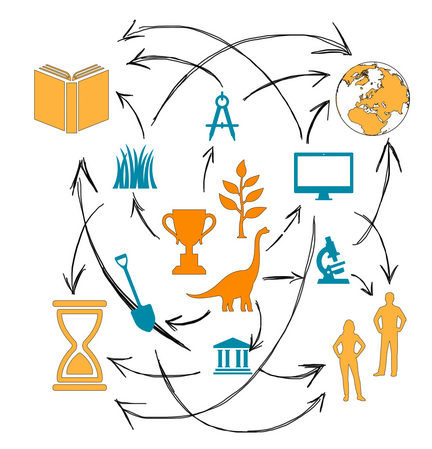Workshops at the DHd 2025

Topics Object biography and metadata for digital editions
Review
Workshop on object biography
The Friedrich-Alexander-Universität Erlangen-Nürnberg and the Klassik Stiftung Weimar were represented with a workshop on object biography as an approach for integrative data modelling. Participants were first introduced to the basics of digital object documentation, from metadata, standardised data and terminology to the minimum dataset recommendation for museums and collections from the Minimal Dataset Working Group, metadata standards Dublin Core and LIDO, semantic web technologies and the CIDOC CRM as an ISO-certified reference ontology. The current development status of the object biography data model, which is based on the CIDOC CRM, and its implementation and application in WissKI were then presented. The so-called Behaim Globe in the Germanic National Museum in Nuremberg from 1492 served as an example, which is the oldest preserved terrestrial globe and contains encyclopaedic world knowledge of inestimable value, has a rich life history and was recently even declared a UNESCO World Documentary Heritage. In the course of the data model development, it served as an important use case, also to test the handling of vagueness and uncertainties or to depict various analyses and research projects to which it was subjected. In the second part of the workshop, semantic modelling was then taught in a practical way using specific questions and examples from the participants, including Jewish gravestones and the Rosetta Stone. The slides of the workshop can be found here: https://zenodo.org/records/15126917.
Joint workshop of the NFDI4Memory, Text+ and NFDI4Objects consortia
In a joint workshop organised by the NFDI4Memory, NFDI4Objects and Text+ consortia at DHd2025, an introduction to the topic of metadata was given on the basis of specific use cases. Metadata is a central component in making data publications available for reuse. It contains information about the provenance, collection and processing of data. In this way, information provenance can be ensured. Editions already contain numerous metadata in registers and apparatuses, e.g. about persons and geographies that appear in the texts.
An introduction to the DublinCore, TEI and LIDO standards was provided, the importance of standardised data and controlled vocabularies was sharpened and the minimum dataset recommendation for museums and collections of the Minimal Dataset Working Group was presented. The slides can be found at Zenodo: https://zenodo.org/records/15052040.
Announcement
The annual Digital Humanities conference in German-speaking countries will take place in Bielefeld from 3 to 7 March. Our consortium will be represented with the workshop ‘Object biography - an approach for integrative data modelling: properties, opportunities and possible applications’, which will be held by Anja Gerber (Klassik Stiftung Weimar) and Sarah Wagner and Günther Görz (FAU Erlangen-Nürnberg). The workshop will take place on 4 March 2025.
There will also be an information desk of the Humanities@NFDI consortia again, where the colleagues from NFDI4Culture, NFDI4Memory, NFDI4Objects and Text+ will welcome you.
Figure: Schematic representation of an object biography, Sarah Wagner, CC BY 4.0